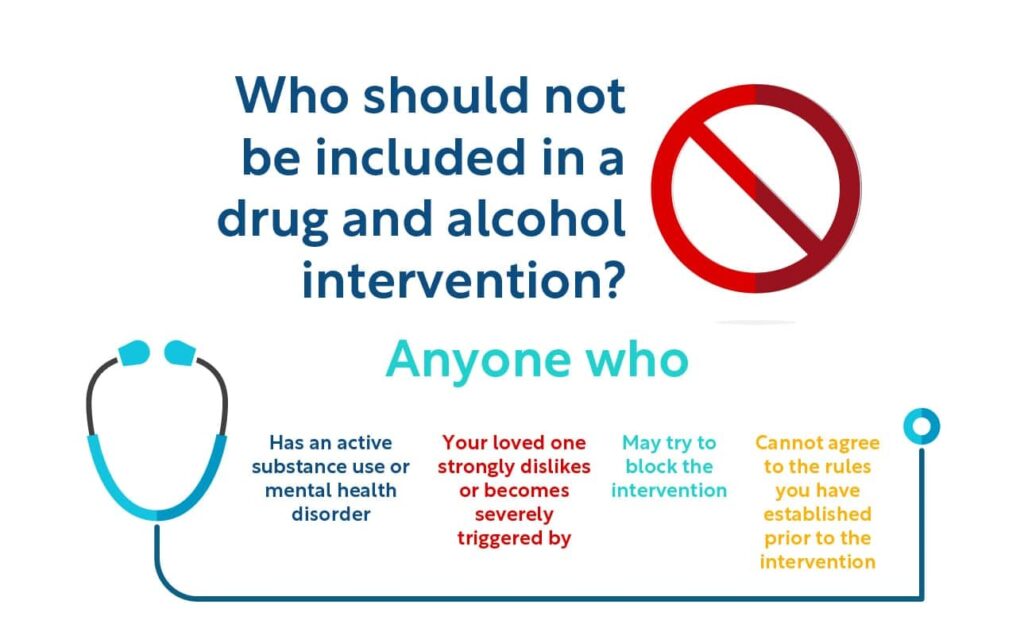How to Plan a Drug and Alcohol Intervention
An intervention can take many forms. All feature a planned confrontation between a person in active addiction and the people who love and support them. Ideally, the intervention will happen with a trained intervention specialist or mental health professional.
The goal is to intervene when someone is addicted to substances, cannot stop on their own, and is headed down a dangerous path.
Often, a person in active addiction is afraid or embarrassed to ask for help. Other times, they may not even be aware of how their behavior or mental illness is harming themselves and others.
The intervention process is tough to participate in. Friends and family try to spark the motivation for an individual who struggles with a substance use disorder from a place of love and support.
It can be an extremely vulnerable situation for every person involved. It takes a significant amount of courage to intervene with someone struggling with addiction. The most important step in the process of an intervention is acting with deliberate care.
Find the location that works for you.

When Should Others Intervene?
Usually, people will stage an intervention when a loved one has been unwilling to seek help for their addiction. When an intervention is successful, the concerned party will be able to clearly and lovingly state their feelings. The person struggling with addiction is able to participate constructively and be receptive to others’ concerns and ideas about moving toward change.
Many people end up feeling criticized, ganged up on, or attacked during an intervention, so it is important to seek help or advice from someone who is professionally trained in proper intervention strategies.
There is no right or wrong answer about when to hold an intervention for a loved one, so it can be hard to decide how and when to do so. However, there are some signs that it might be time.
While these can also be signs of a mental health issue, you may consider asking a professional about holding an intervention if your loved one displays the following.
Exhibiting Sneaky Behavior
If a person begins concealing their activities/behaviors (where they are going, who they are spending time with, what they are spending money on, etc.), this can be a sign that their substance use is out of control. If this behavior has been going on consistently for some time (i.e., not just a few independent occasions), it can indicate an addiction.
Borrowing Money
Addicts and alcoholics often get into trouble with money. It becomes more important than anything else to acquire that substance at all costs. This can lead to extreme financial issues and the need to borrow money.
It might be time to intervene if your loved one has been having excessive money troubles or is constantly asking for money.
Neglect of Appearance
Addiction often leaves a person feeling so bad and unlike themselves that they even stop looking like themselves. If loved ones see a person has started to ignore their personal hygiene or neglect their appearance completely, this is another sign that they might be stuck in a harmful cycle of addiction.
To learn more, call Zinnia Health at (855) 430-9439.
Losing Interest in Life
When addiction takes over a person’s life, they can begin to neglect important aspects of their lives. It is hard to enjoy previous activities while they are addicted, because seeking and using the substance becomes more important than everything else.
If a loved one has lost interest in hobbies, friends, relationships, work, or other interests, it might be time to talk to them about their substance use.
Engaging in Destructive Behaviors
Addiction and withdrawal can cause people to act very unlike themselves and to exhibit aggressive, destructive, and sometimes even abusive behaviors. This can be frightening to loved ones and is often an indicator that it is time to intervene as quickly as possible.
Seeking Professional Help
Most interventions should seek the help of a licensed counselor. They can act as a useful guide through the process and particularly through aspects of an intervention that many people may not initially consider.
Addiction is a family disease. Often, all members of the family have become sick or unable to deal with their addicted love one in a healthy way.
Intervention specialists have training in leading these group meetings. Thus, an intervention specialist offers more successful interventions than those that have only loved ones orchestrating the conversation.
Additionally, it can sometimes feel comforting to the person being addressed to have a neutral party involved to guide communication. This offers the addict a chance to contribute to the conversation.
Some ways that a professional interventionist can help include the following.
Structured Organization of the Event
Professional guidance can help you and your loved ones explain your side while the interventionist facilitates the conversation.
Clinically Analyze and Process the Circumstances That Have Led to the Intervention
Because interventions can be emotionally driven, it can be helpful to have an interventionist move the conversation along to establish support and solutions. They can also explore factors you and your loved ones may be unaware of.
A Potential Location to Engage in the Intervention
A counselor’s office or treatment center are safe places to hold an intervention if all parties are willing.
How to Plan a Drug and Alcohol Intervention
Interventions are possible without a third party. However, whether you call upon the help of a professional interventionist or decide to host the intervention yourself, having a plan is crucial to the success of the event.
Following a step-by-step guide can help all members involved and ultimately is the best way to engage.
The National Institute on Drug Abuse (NIDA)’s recommends the following steps for an alcohol or drug intervention.
Making a Plan
You or someone close to the affected individual should form a group of people to help you plan it. Some options include a qualified professional counselor, an addiction professional, a psychologist, a mental health counselor, a social worker, or an interventionist.
Planning is important to ensure the least amount of aggravation or emotional outbursts for both sides.
The intervention specialist can work with everyone who wants to be present for the intervention, including:
- Parents
- Siblings
- Spouses
- Partners
- Close friends
Gathering Pertinent Information
The group members determine how much your loved one’s problem has progressed and research the condition and treatment programs. The group may initiate arrangements to enroll your loved one in a specific treatment program.
Those with mental health disorders will want to find a behavioral health facility with a supportive treatment plan.
Deciding Who Will Join the Intervention
Those involved with planning form a team that will personally participate in the intervention. Members set a date and location and work together to present a consistent message and a deliberate plan.
Participants should keep the conversation focused on the facts of the problem and potential solutions. Emotional responses can further aggravate the process. Make sure that everyone involved understands addiction and recovery.
By learning as much as possible about the topics, they can address the individual with compassion and knowledge. Ensure your loved one is unaware of the intervention going in. This can prevent them from minimizing the issue by preparing what to say.
Deciding Specific Boundaries
If your loved one won’t seek treatment, each person participating needs to decide how to avoid supporting their addiction. Examples include asking the affected individual to move out or deciding not to support them financially.
Preparing Notes for Statements
Each participant describes incidents where the substance use disorder caused problems — events like emotional or financial issues. Discuss the toll of your loved one’s behavior while still expressing your love and support through the change.
It is very hard for a person struggling to see how their actions are affecting others. It helps break through the denial when loved ones explain, with compassion, how and why they have been hurt.
Hosting (Or Organizing) the Actual Event
Without revealing the reason for a gathering, your loved one with an addiction is asked to the intervention site. Members of the team then take turns expressing their perspectives.
Your loved one is presented with a treatment option (or the outlet to receive treatment) and asked to accept that option on the spot. Each team member will say what specific changes he or she will make if your loved one does not accept the plan.
Do not threaten a consequence unless you and the participants involved are prepared to act upon it. Limit the amount of time for the intervention – it shouldn’t drag on all day. Usually 30 to 90 minutes is an appropriate amount of time for everyone to be able to speak about their feelings and concerns.
Following Up
Involving a spouse, family members, or others is critical to help someone with an addiction stay in treatment. Staying in treatment helps to avoid relapse. One should have measures in place to make sure the person is following through on their treatment process agreed to during the intervention.
An individual can be held accountable for their recovery process by determining concrete next steps during the meeting.
Your loved one might need:
- Detox
- Inpatient treatment
- Outpatient rehab
- Support groups like Alcoholics Anonymous (AA) and Narcotics Anonymous (NA).
Groups like AA and NA provide ongoing support and guidance.
Detox can help with the initial withdrawal symptoms. Inpatient treatment provides intensive care and support. Outpatient rehab offers therapy and support while allowing the person to live at home.

What to Avoid at an Intervention
Even with adequate preparation, there are risks that everyone should avoid during an intervention.
These include the following.
Labels
Referring to your loved one as an alcoholic, junkie, addict, or other detrimental labels can be discouraging and demeaning. These can be derogatory and insulting and might make a person more resistant to getting help. Instead, opt for more neutral terms and do not reduce a person to a label. They are a person of value who is struggling with a disease.
Overcrowding
Having too many people at the intervention can make the situation too overwhelming for the person being confronted. Try to limit the group to only a few close friends and family.
Getting Too Emotional
An intervention will be a very emotional process, but it is not helpful to have everyone’s personal feelings take up too much space in the intervention. Remember that the event is happening in order to show the person that their friends and family care about them and are concerned.
Find a way to manage or limit personal feelings that may come off as accusatory or hard for the person to hear.
Confronting Someone Who Is Intoxicated
Having an intervention with someone who is intoxicated is not likely to have a good outcome. They could end up becoming defensive, aggressive, or might not even remember the event. Be prepared and wait for a time when the person will likely be sober so that you can address them while they are clear-headed.
If you or a loved one have any questions regarding interventions, or need help to find treatment, call Zinnia Health at (855) 430-9439 for more information.

